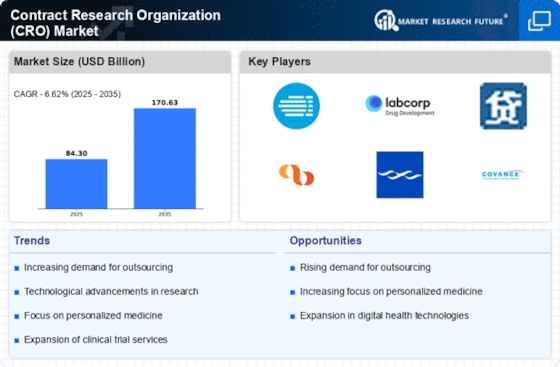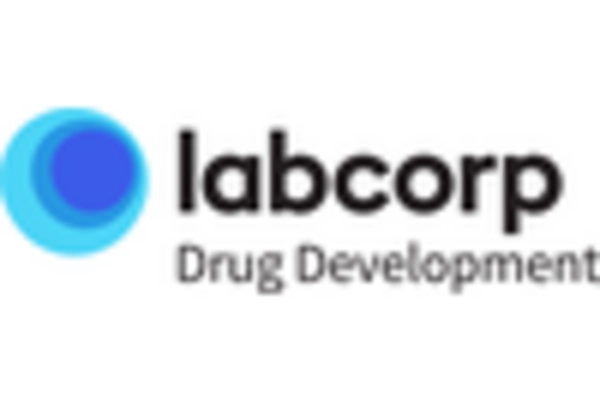-
EXECUTIVE SUMMARY
-
Market Overview
-
Key Findings
-
Market Segmentation
-
Competitive Landscape
-
Challenges and Opportunities
-
Future Outlook
-
MARKET INTRODUCTION
-
Definition
-
Scope of the study
- Research Objective
- Assumption
- Limitations
-
RESEARCH METHODOLOGY
-
Overview
-
Data Mining
-
Secondary Research
-
Primary Research
- Primary Interviews and Information Gathering Process
- Breakdown of Primary Respondents
-
Forecasting Model
-
Market Size Estimation
- Bottom-Up Approach
- Top-Down Approach
-
Data Triangulation
-
Validation
-
MARKET DYNAMICS
-
Overview
-
Drivers
-
Restraints
-
Opportunities
-
MARKET FACTOR ANALYSIS
-
Value chain Analysis
-
Porter's Five Forces Analysis
- Bargaining Power of Suppliers
- Bargaining Power of Buyers
- Threat of New Entrants
- Threat of Substitutes
- Intensity of Rivalry
-
COVID-19 Impact Analysis
- Market Impact Analysis
- Regional Impact
- Opportunity and Threat Analysis
-
CONTRACT RESEARCH ORGANIZATION (CRO) Contract Research Organization Market, BY SERVICE TYPE (USD BILLION)
-
Clinical Research Services
-
Preclinical Services
-
Laboratory Services
-
Consulting Services
-
CONTRACT RESEARCH ORGANIZATION (CRO) Contract Research Organization Market, BY THERAPEUTIC AREA (USD BILLION)
-
Oncology
-
Cardiology
-
Neurology
-
Infectious Diseases
-
Endocrinology
-
CONTRACT RESEARCH ORGANIZATION (CRO) Contract Research Organization Market, BY END USER (USD BILLION)
-
Pharmaceutical Companies
-
Biotechnology Companies
-
Medical Device Companies
-
Academic Institutions
-
CONTRACT RESEARCH ORGANIZATION (CRO) Contract Research Organization Market, BY PHASE OF DEVELOPMENT (USD BILLION)
-
Preclinical
-
Phase I
-
Phase II
-
Phase III
-
Phase IV
-
CONTRACT RESEARCH ORGANIZATION (CRO) Contract Research Organization Market, BY REGIONAL (USD BILLION)
-
North America
- US
- Canada
-
Europe
- Germany
- UK
- France
- Russia
- Italy
- Spain
- Rest of Europe
-
APAC
- China
- India
- Japan
- South Korea
- Malaysia
- Thailand
- Indonesia
- Rest of APAC
-
South America
- Brazil
- Mexico
- Argentina
- Rest of South America
-
MEA
- GCC Countries
- South Africa
- Rest of MEA
-
COMPETITIVE LANDSCAPE
-
Overview
-
Competitive Analysis
-
Market share Analysis
-
Major Growth Strategy in the Contract Research Organization (CRO) Market
-
Competitive Benchmarking
-
Leading Players in Terms of Number of Developments in the Contract Research Organization (CRO) Market
-
Key developments and growth strategies
- New Product Launch/Service Deployment
- Merger & Acquisitions
- Joint Ventures
-
Major Players Financial Matrix
- Sales and Operating Income
- Major Players R&D Expenditure. 2023
-
COMPANY PROFILES
-
Charles River Laboratories
- Financial Overview
- Products Offered
- Key Developments
- SWOT Analysis
- Key Strategies
-
Parexel International
- Financial Overview
- Products Offered
- Key Developments
- SWOT Analysis
- Key Strategies
-
Medpace
- Financial Overview
- Products Offered
- Key Developments
- SWOT Analysis
- Key Strategies
-
PPD
- Financial Overview
- Products Offered
- Key Developments
- SWOT Analysis
- Key Strategies
-
Advanced Clinical
- Financial Overview
- Products Offered
- Key Developments
- SWOT Analysis
- Key Strategies
-
PRA Health Sciences
- Financial Overview
- Products Offered
- Key Developments
- SWOT Analysis
- Key Strategies
-
IQVIA
- Financial Overview
- Products Offered
- Key Developments
- SWOT Analysis
- Key Strategies
-
Syneos Health
- Financial Overview
- Products Offered
- Key Developments
- SWOT Analysis
- Key Strategies
-
Icon plc
- Financial Overview
- Products Offered
- Key Developments
- SWOT Analysis
- Key Strategies
-
KCR
- Financial Overview
- Products Offered
- Key Developments
- SWOT Analysis
- Key Strategies
-
Clinical Research Services
- Financial Overview
- Products Offered
- Key Developments
- SWOT Analysis
- Key Strategies
-
WuXi AppTec
- Financial Overview
- Products Offered
- Key Developments
- SWOT Analysis
- Key Strategies
-
BioClinica
- Financial Overview
- Products Offered
- Key Developments
- SWOT Analysis
- Key Strategies
-
Covance
- Financial Overview
- Products Offered
- Key Developments
- SWOT Analysis
- Key Strategies
-
CTI Clinical Trial and Consulting Services
- Financial Overview
- Products Offered
- Key Developments
- SWOT Analysis
- Key Strategies
-
APPENDIX
-
References
-
Related Reports
-
LIST OF TABLES
-
LIST OF ASSUMPTIONS
-
NORTH AMERICA CONTRACT RESEARCH ORGANIZATION (CRO) MARKET SIZE ESTIMATES & Contract Research Organization Market, BY SERVICE TYPE, 2019-2035 (USD BILLIONS)
-
NORTH AMERICA CONTRACT RESEARCH ORGANIZATION (CRO) MARKET SIZE ESTIMATES & Contract Research Organization Market, BY THERAPEUTIC AREA, 2019-2035 (USD BILLIONS)
-
NORTH AMERICA CONTRACT RESEARCH ORGANIZATION (CRO) MARKET SIZE ESTIMATES & Contract Research Organization Market, BY END USER, 2019-2035 (USD BILLIONS)
-
NORTH AMERICA CONTRACT RESEARCH ORGANIZATION (CRO) MARKET SIZE ESTIMATES & Contract Research Organization Market, BY PHASE OF DEVELOPMENT, 2019-2035 (USD BILLIONS)
-
NORTH AMERICA CONTRACT RESEARCH ORGANIZATION (CRO) MARKET SIZE ESTIMATES & Contract Research Organization Market, BY REGIONAL, 2019-2035 (USD BILLIONS)
-
US CONTRACT RESEARCH ORGANIZATION (CRO) MARKET SIZE ESTIMATES & Contract Research Organization Market, BY SERVICE TYPE, 2019-2035 (USD BILLIONS)
-
US CONTRACT RESEARCH ORGANIZATION (CRO) MARKET SIZE ESTIMATES & Contract Research Organization Market, BY THERAPEUTIC AREA, 2019-2035 (USD BILLIONS)
-
US CONTRACT RESEARCH ORGANIZATION (CRO) MARKET SIZE ESTIMATES & Contract Research Organization Market, BY END USER, 2019-2035 (USD BILLIONS)
-
US CONTRACT RESEARCH ORGANIZATION (CRO) MARKET SIZE ESTIMATES & Contract Research Organization Market, BY PHASE OF DEVELOPMENT, 2019-2035 (USD BILLIONS)
-
US CONTRACT RESEARCH ORGANIZATION (CRO) MARKET SIZE ESTIMATES & Contract Research Organization Market, BY REGIONAL, 2019-2035 (USD BILLIONS)
-
CANADA CONTRACT RESEARCH ORGANIZATION (CRO) MARKET SIZE ESTIMATES & Contract Research Organization Market, BY SERVICE TYPE, 2019-2035 (USD BILLIONS)
-
CANADA CONTRACT RESEARCH ORGANIZATION (CRO) MARKET SIZE ESTIMATES & Contract Research Organization Market, BY THERAPEUTIC AREA, 2019-2035 (USD BILLIONS)
-
CANADA CONTRACT RESEARCH ORGANIZATION (CRO) MARKET SIZE ESTIMATES & Contract Research Organization Market, BY END USER, 2019-2035 (USD BILLIONS)
-
CANADA CONTRACT RESEARCH ORGANIZATION (CRO) MARKET SIZE ESTIMATES & Contract Research Organization Market, BY PHASE OF DEVELOPMENT, 2019-2035 (USD BILLIONS)
-
CANADA CONTRACT RESEARCH ORGANIZATION (CRO) MARKET SIZE ESTIMATES & Contract Research Organization Market, BY REGIONAL, 2019-2035 (USD BILLIONS)
-
EUROPE CONTRACT RESEARCH ORGANIZATION (CRO) MARKET SIZE ESTIMATES & Contract Research Organization Market, BY SERVICE TYPE, 2019-2035 (USD BILLIONS)
-
EUROPE CONTRACT RESEARCH ORGANIZATION (CRO) MARKET SIZE ESTIMATES & Contract Research Organization Market, BY THERAPEUTIC AREA, 2019-2035 (USD BILLIONS)
-
EUROPE CONTRACT RESEARCH ORGANIZATION (CRO) MARKET SIZE ESTIMATES & Contract Research Organization Market, BY END USER, 2019-2035 (USD BILLIONS)
-
EUROPE CONTRACT RESEARCH ORGANIZATION (CRO) MARKET SIZE ESTIMATES & Contract Research Organization Market, BY PHASE OF DEVELOPMENT, 2019-2035 (USD BILLIONS)
-
EUROPE CONTRACT RESEARCH ORGANIZATION (CRO) MARKET SIZE ESTIMATES & Contract Research Organization Market, BY REGIONAL, 2019-2035 (USD BILLIONS)
-
GERMANY CONTRACT RESEARCH ORGANIZATION (CRO) MARKET SIZE ESTIMATES & Contract Research Organization Market, BY SERVICE TYPE, 2019-2035 (USD BILLIONS)
-
GERMANY CONTRACT RESEARCH ORGANIZATION (CRO) MARKET SIZE ESTIMATES & Contract Research Organization Market, BY THERAPEUTIC AREA, 2019-2035 (USD BILLIONS)
-
GERMANY CONTRACT RESEARCH ORGANIZATION (CRO) MARKET SIZE ESTIMATES & Contract Research Organization Market, BY END USER, 2019-2035 (USD BILLIONS)
-
GERMANY CONTRACT RESEARCH ORGANIZATION (CRO) MARKET SIZE ESTIMATES & Contract Research Organization Market, BY PHASE OF DEVELOPMENT, 2019-2035 (USD BILLIONS)
-
GERMANY CONTRACT RESEARCH ORGANIZATION (CRO) MARKET SIZE ESTIMATES & Contract Research Organization Market, BY REGIONAL, 2019-2035 (USD BILLIONS)
-
UK CONTRACT RESEARCH ORGANIZATION (CRO) MARKET SIZE ESTIMATES & Contract Research Organization Market, BY SERVICE TYPE, 2019-2035 (USD BILLIONS)
-
UK CONTRACT RESEARCH ORGANIZATION (CRO) MARKET SIZE ESTIMATES & Contract Research Organization Market, BY THERAPEUTIC AREA, 2019-2035 (USD BILLIONS)
-
UK CONTRACT RESEARCH ORGANIZATION (CRO) MARKET SIZE ESTIMATES & Contract Research Organization Market, BY END USER, 2019-2035 (USD BILLIONS)
-
UK CONTRACT RESEARCH ORGANIZATION (CRO) MARKET SIZE ESTIMATES & Contract Research Organization Market, BY PHASE OF DEVELOPMENT, 2019-2035 (USD BILLIONS)
-
UK CONTRACT RESEARCH ORGANIZATION (CRO) MARKET SIZE ESTIMATES & Contract Research Organization Market, BY REGIONAL, 2019-2035 (USD BILLIONS)
-
FRANCE CONTRACT RESEARCH ORGANIZATION (CRO) MARKET SIZE ESTIMATES & Contract Research Organization Market, BY SERVICE TYPE, 2019-2035 (USD BILLIONS)
-
FRANCE CONTRACT RESEARCH ORGANIZATION (CRO) MARKET SIZE ESTIMATES & Contract Research Organization Market, BY THERAPEUTIC AREA, 2019-2035 (USD BILLIONS)
-
FRANCE CONTRACT RESEARCH ORGANIZATION (CRO) MARKET SIZE ESTIMATES & Contract Research Organization Market, BY END USER, 2019-2035 (USD BILLIONS)
-
FRANCE CONTRACT RESEARCH ORGANIZATION (CRO) MARKET SIZE ESTIMATES & Contract Research Organization Market, BY PHASE OF DEVELOPMENT, 2019-2035 (USD BILLIONS)
-
FRANCE CONTRACT RESEARCH ORGANIZATION (CRO) MARKET SIZE ESTIMATES & Contract Research Organization Market, BY REGIONAL, 2019-2035 (USD BILLIONS)
-
RUSSIA CONTRACT RESEARCH ORGANIZATION (CRO) MARKET SIZE ESTIMATES & Contract Research Organization Market, BY SERVICE TYPE, 2019-2035 (USD BILLIONS)
-
RUSSIA CONTRACT RESEARCH ORGANIZATION (CRO) MARKET SIZE ESTIMATES & Contract Research Organization Market, BY THERAPEUTIC AREA, 2019-2035 (USD BILLIONS)
-
RUSSIA CONTRACT RESEARCH ORGANIZATION (CRO) MARKET SIZE ESTIMATES & Contract Research Organization Market, BY END USER, 2019-2035 (USD BILLIONS)
-
RUSSIA CONTRACT RESEARCH ORGANIZATION (CRO) MARKET SIZE ESTIMATES & Contract Research Organization Market, BY PHASE OF DEVELOPMENT, 2019-2035 (USD BILLIONS)
-
RUSSIA CONTRACT RESEARCH ORGANIZATION (CRO) MARKET SIZE ESTIMATES & Contract Research Organization Market, BY REGIONAL, 2019-2035 (USD BILLIONS)
-
ITALY CONTRACT RESEARCH ORGANIZATION (CRO) MARKET SIZE ESTIMATES & Contract Research Organization Market, BY SERVICE TYPE, 2019-2035 (USD BILLIONS)
-
ITALY CONTRACT RESEARCH ORGANIZATION (CRO) MARKET SIZE ESTIMATES & Contract Research Organization Market, BY THERAPEUTIC AREA, 2019-2035 (USD BILLIONS)
-
ITALY CONTRACT RESEARCH ORGANIZATION (CRO) MARKET SIZE ESTIMATES & Contract Research Organization Market, BY END USER, 2019-2035 (USD BILLIONS)
-
ITALY CONTRACT RESEARCH ORGANIZATION (CRO) MARKET SIZE ESTIMATES & Contract Research Organization Market, BY PHASE OF DEVELOPMENT, 2019-2035 (USD BILLIONS)
-
ITALY CONTRACT RESEARCH ORGANIZATION (CRO) MARKET SIZE ESTIMATES & Contract Research Organization Market, BY REGIONAL, 2019-2035 (USD BILLIONS)
-
SPAIN CONTRACT RESEARCH ORGANIZATION (CRO) MARKET SIZE ESTIMATES & Contract Research Organization Market, BY SERVICE TYPE, 2019-2035 (USD BILLIONS)
-
SPAIN CONTRACT RESEARCH ORGANIZATION (CRO) MARKET SIZE ESTIMATES & Contract Research Organization Market, BY THERAPEUTIC AREA, 2019-2035 (USD BILLIONS)
-
SPAIN CONTRACT RESEARCH ORGANIZATION (CRO) MARKET SIZE ESTIMATES & Contract Research Organization Market, BY END USER, 2019-2035 (USD BILLIONS)
-
SPAIN CONTRACT RESEARCH ORGANIZATION (CRO) MARKET SIZE ESTIMATES & Contract Research Organization Market, BY PHASE OF DEVELOPMENT, 2019-2035 (USD BILLIONS)
-
SPAIN CONTRACT RESEARCH ORGANIZATION (CRO) MARKET SIZE ESTIMATES & Contract Research Organization Market, BY REGIONAL, 2019-2035 (USD BILLIONS)
-
REST OF EUROPE CONTRACT RESEARCH ORGANIZATION (CRO) MARKET SIZE ESTIMATES & Contract Research Organization Market, BY SERVICE TYPE, 2019-2035 (USD BILLIONS)
-
REST OF EUROPE CONTRACT RESEARCH ORGANIZATION (CRO) MARKET SIZE ESTIMATES & Contract Research Organization Market, BY THERAPEUTIC AREA, 2019-2035 (USD BILLIONS)
-
REST OF EUROPE CONTRACT RESEARCH ORGANIZATION (CRO) MARKET SIZE ESTIMATES & Contract Research Organization Market, BY END USER, 2019-2035 (USD BILLIONS)
-
REST OF EUROPE CONTRACT RESEARCH ORGANIZATION (CRO) MARKET SIZE ESTIMATES & Contract Research Organization Market, BY PHASE OF DEVELOPMENT, 2019-2035 (USD BILLIONS)
-
REST OF EUROPE CONTRACT RESEARCH ORGANIZATION (CRO) MARKET SIZE ESTIMATES & Contract Research Organization Market, BY REGIONAL, 2019-2035 (USD BILLIONS)
-
APAC CONTRACT RESEARCH ORGANIZATION (CRO) MARKET SIZE ESTIMATES & Contract Research Organization Market, BY SERVICE TYPE, 2019-2035 (USD BILLIONS)
-
APAC CONTRACT RESEARCH ORGANIZATION (CRO) MARKET SIZE ESTIMATES & Contract Research Organization Market, BY THERAPEUTIC AREA, 2019-2035 (USD BILLIONS)
-
APAC CONTRACT RESEARCH ORGANIZATION (CRO) MARKET SIZE ESTIMATES & Contract Research Organization Market, BY END USER, 2019-2035 (USD BILLIONS)
-
APAC CONTRACT RESEARCH ORGANIZATION (CRO) MARKET SIZE ESTIMATES & Contract Research Organization Market, BY PHASE OF DEVELOPMENT, 2019-2035 (USD BILLIONS)
-
APAC CONTRACT RESEARCH ORGANIZATION (CRO) MARKET SIZE ESTIMATES & Contract Research Organization Market, BY REGIONAL, 2019-2035 (USD BILLIONS)
-
CHINA CONTRACT RESEARCH ORGANIZATION (CRO) MARKET SIZE ESTIMATES & Contract Research Organization Market, BY SERVICE TYPE, 2019-2035 (USD BILLIONS)
-
CHINA CONTRACT RESEARCH ORGANIZATION (CRO) MARKET SIZE ESTIMATES & Contract Research Organization Market, BY THERAPEUTIC AREA, 2019-2035 (USD BILLIONS)
-
CHINA CONTRACT RESEARCH ORGANIZATION (CRO) MARKET SIZE ESTIMATES & Contract Research Organization Market, BY END USER, 2019-2035 (USD BILLIONS)
-
CHINA CONTRACT RESEARCH ORGANIZATION (CRO) MARKET SIZE ESTIMATES & Contract Research Organization Market, BY PHASE OF DEVELOPMENT, 2019-2035 (USD BILLIONS)
-
CHINA CONTRACT RESEARCH ORGANIZATION (CRO) MARKET SIZE ESTIMATES & Contract Research Organization Market, BY REGIONAL, 2019-2035 (USD BILLIONS)
-
INDIA CONTRACT RESEARCH ORGANIZATION (CRO) MARKET SIZE ESTIMATES & Contract Research Organization Market, BY SERVICE TYPE, 2019-2035 (USD BILLIONS)
-
INDIA CONTRACT RESEARCH ORGANIZATION (CRO) MARKET SIZE ESTIMATES & Contract Research Organization Market, BY THERAPEUTIC AREA, 2019-2035 (USD BILLIONS)
-
INDIA CONTRACT RESEARCH ORGANIZATION (CRO) MARKET SIZE ESTIMATES & Contract Research Organization Market, BY END USER, 2019-2035 (USD BILLIONS)
-
INDIA CONTRACT RESEARCH ORGANIZATION (CRO) MARKET SIZE ESTIMATES & Contract Research Organization Market, BY PHASE OF DEVELOPMENT, 2019-2035 (USD BILLIONS)
-
INDIA CONTRACT RESEARCH ORGANIZATION (CRO) MARKET SIZE ESTIMATES & Contract Research Organization Market, BY REGIONAL, 2019-2035 (USD BILLIONS)
-
JAPAN CONTRACT RESEARCH ORGANIZATION (CRO) MARKET SIZE ESTIMATES & Contract Research Organization Market, BY SERVICE TYPE, 2019-2035 (USD BILLIONS)
-
JAPAN CONTRACT RESEARCH ORGANIZATION (CRO) MARKET SIZE ESTIMATES & Contract Research Organization Market, BY THERAPEUTIC AREA, 2019-2035 (USD BILLIONS)
-
JAPAN CONTRACT RESEARCH ORGANIZATION (CRO) MARKET SIZE ESTIMATES & Contract Research Organization Market, BY END USER, 2019-2035 (USD BILLIONS)
-
JAPAN CONTRACT RESEARCH ORGANIZATION (CRO) MARKET SIZE ESTIMATES & Contract Research Organization Market, BY PHASE OF DEVELOPMENT, 2019-2035 (USD BILLIONS)
-
JAPAN CONTRACT RESEARCH ORGANIZATION (CRO) MARKET SIZE ESTIMATES & Contract Research Organization Market, BY REGIONAL, 2019-2035 (USD BILLIONS)
-
SOUTH KOREA CONTRACT RESEARCH ORGANIZATION (CRO) MARKET SIZE ESTIMATES & Contract Research Organization Market, BY SERVICE TYPE, 2019-2035 (USD BILLIONS)
-
SOUTH KOREA CONTRACT RESEARCH ORGANIZATION (CRO) MARKET SIZE ESTIMATES & Contract Research Organization Market, BY THERAPEUTIC AREA, 2019-2035 (USD BILLIONS)
-
SOUTH KOREA CONTRACT RESEARCH ORGANIZATION (CRO) MARKET SIZE ESTIMATES & Contract Research Organization Market, BY END USER, 2019-2035 (USD BILLIONS)
-
SOUTH KOREA CONTRACT RESEARCH ORGANIZATION (CRO) MARKET SIZE ESTIMATES & Contract Research Organization Market, BY PHASE OF DEVELOPMENT, 2019-2035 (USD BILLIONS)
-
SOUTH KOREA CONTRACT RESEARCH ORGANIZATION (CRO) MARKET SIZE ESTIMATES & Contract Research Organization Market, BY REGIONAL, 2019-2035 (USD BILLIONS)
-
MALAYSIA CONTRACT RESEARCH ORGANIZATION (CRO) MARKET SIZE ESTIMATES & Contract Research Organization Market, BY SERVICE TYPE, 2019-2035 (USD BILLIONS)
-
MALAYSIA CONTRACT RESEARCH ORGANIZATION (CRO) MARKET SIZE ESTIMATES & Contract Research Organization Market, BY THERAPEUTIC AREA, 2019-2035 (USD BILLIONS)
-
MALAYSIA CONTRACT RESEARCH ORGANIZATION (CRO) MARKET SIZE ESTIMATES & Contract Research Organization Market, BY END USER, 2019-2035 (USD BILLIONS)
-
MALAYSIA CONTRACT RESEARCH ORGANIZATION (CRO) MARKET SIZE ESTIMATES & Contract Research Organization Market, BY PHASE OF DEVELOPMENT, 2019-2035 (USD BILLIONS)
-
MALAYSIA CONTRACT RESEARCH ORGANIZATION (CRO) MARKET SIZE ESTIMATES & Contract Research Organization Market, BY REGIONAL, 2019-2035 (USD BILLIONS)
-
THAILAND CONTRACT RESEARCH ORGANIZATION (CRO) MARKET SIZE ESTIMATES & Contract Research Organization Market, BY SERVICE TYPE, 2019-2035 (USD BILLIONS)
-
THAILAND CONTRACT RESEARCH ORGANIZATION (CRO) MARKET SIZE ESTIMATES & Contract Research Organization Market, BY THERAPEUTIC AREA, 2019-2035 (USD BILLIONS)
-
THAILAND CONTRACT RESEARCH ORGANIZATION (CRO) MARKET SIZE ESTIMATES & Contract Research Organization Market, BY END USER, 2019-2035 (USD BILLIONS)
-
THAILAND CONTRACT RESEARCH ORGANIZATION (CRO) MARKET SIZE ESTIMATES & Contract Research Organization Market, BY PHASE OF DEVELOPMENT, 2019-2035 (USD BILLIONS)
-
THAILAND CONTRACT RESEARCH ORGANIZATION (CRO) MARKET SIZE ESTIMATES & Contract Research Organization Market, BY REGIONAL, 2019-2035 (USD BILLIONS)
-
INDONESIA CONTRACT RESEARCH ORGANIZATION (CRO) MARKET SIZE ESTIMATES & Contract Research Organization Market, BY SERVICE TYPE, 2019-2035 (USD BILLIONS)
-
INDONESIA CONTRACT RESEARCH ORGANIZATION (CRO) MARKET SIZE ESTIMATES & Contract Research Organization Market, BY THERAPEUTIC AREA, 2019-2035 (USD BILLIONS)
-
INDONESIA CONTRACT RESEARCH ORGANIZATION (CRO) MARKET SIZE ESTIMATES & Contract Research Organization Market, BY END USER, 2019-2035 (USD BILLIONS)
-
INDONESIA CONTRACT RESEARCH ORGANIZATION (CRO) MARKET SIZE ESTIMATES & Contract Research Organization Market, BY PHASE OF DEVELOPMENT, 2019-2035 (USD BILLIONS)
-
INDONESIA CONTRACT RESEARCH ORGANIZATION (CRO) MARKET SIZE ESTIMATES & Contract Research Organization Market, BY REGIONAL, 2019-2035 (USD BILLIONS)
-
REST OF APAC CONTRACT RESEARCH ORGANIZATION (CRO) MARKET SIZE ESTIMATES & Contract Research Organization Market, BY SERVICE TYPE, 2019-2035 (USD BILLIONS)
-
REST OF APAC CONTRACT RESEARCH ORGANIZATION (CRO) MARKET SIZE ESTIMATES & Contract Research Organization Market, BY THERAPEUTIC AREA, 2019-2035 (USD BILLIONS)
-
REST OF APAC CONTRACT RESEARCH ORGANIZATION (CRO) MARKET SIZE ESTIMATES & Contract Research Organization Market, BY END USER, 2019-2035 (USD BILLIONS)
-
REST OF APAC CONTRACT RESEARCH ORGANIZATION (CRO) MARKET SIZE ESTIMATES & Contract Research Organization Market, BY PHASE OF DEVELOPMENT, 2019-2035 (USD BILLIONS)
-
REST OF APAC CONTRACT RESEARCH ORGANIZATION (CRO) MARKET SIZE ESTIMATES & Contract Research Organization Market, BY REGIONAL, 2019-2035 (USD BILLIONS)
-
SOUTH AMERICA CONTRACT RESEARCH ORGANIZATION (CRO) MARKET SIZE ESTIMATES & Contract Research Organization Market, BY SERVICE TYPE, 2019-2035 (USD BILLIONS)
-
SOUTH AMERICA CONTRACT RESEARCH ORGANIZATION (CRO) MARKET SIZE ESTIMATES & Contract Research Organization Market, BY THERAPEUTIC AREA, 2019-2035 (USD BILLIONS)
-
SOUTH AMERICA CONTRACT RESEARCH ORGANIZATION (CRO) MARKET SIZE ESTIMATES & Contract Research Organization Market, BY END USER, 2019-2035 (USD BILLIONS)
-
SOUTH AMERICA CONTRACT RESEARCH ORGANIZATION (CRO) MARKET SIZE ESTIMATES & Contract Research Organization Market, BY PHASE OF DEVELOPMENT, 2019-2035 (USD BILLIONS)
-
SOUTH AMERICA CONTRACT RESEARCH ORGANIZATION (CRO) MARKET SIZE ESTIMATES & Contract Research Organization Market, BY REGIONAL, 2019-2035 (USD BILLIONS)
-
BRAZIL CONTRACT RESEARCH ORGANIZATION (CRO) MARKET SIZE ESTIMATES & Contract Research Organization Market, BY SERVICE TYPE, 2019-2035 (USD BILLIONS)
-
BRAZIL CONTRACT RESEARCH ORGANIZATION (CRO) MARKET SIZE ESTIMATES & Contract Research Organization Market, BY THERAPEUTIC AREA, 2019-2035 (USD BILLIONS)
-
BRAZIL CONTRACT RESEARCH ORGANIZATION (CRO) MARKET SIZE ESTIMATES & Contract Research Organization Market, BY END USER, 2019-2035 (USD BILLIONS)
-
BRAZIL CONTRACT RESEARCH ORGANIZATION (CRO) MARKET SIZE ESTIMATES & Contract Research Organization Market, BY PHASE OF DEVELOPMENT, 2019-2035 (USD BILLIONS)
-
BRAZIL CONTRACT RESEARCH ORGANIZATION (CRO) MARKET SIZE ESTIMATES & Contract Research Organization Market, BY REGIONAL, 2019-2035 (USD BILLIONS)
-
MEXICO CONTRACT RESEARCH ORGANIZATION (CRO) MARKET SIZE ESTIMATES & Contract Research Organization Market, BY SERVICE TYPE, 2019-2035 (USD BILLIONS)
-
MEXICO CONTRACT RESEARCH ORGANIZATION (CRO) MARKET SIZE ESTIMATES & Contract Research Organization Market, BY THERAPEUTIC AREA, 2019-2035 (USD BILLIONS)
-
MEXICO CONTRACT RESEARCH ORGANIZATION (CRO) MARKET SIZE ESTIMATES & Contract Research Organization Market, BY END USER, 2019-2035 (USD BILLIONS)
-
MEXICO CONTRACT RESEARCH ORGANIZATION (CRO) MARKET SIZE ESTIMATES & Contract Research Organization Market, BY PHASE OF DEVELOPMENT, 2019-2035 (USD BILLIONS)
-
MEXICO CONTRACT RESEARCH ORGANIZATION (CRO) MARKET SIZE ESTIMATES & Contract Research Organization Market, BY REGIONAL, 2019-2035 (USD BILLIONS)
-
ARGENTINA CONTRACT RESEARCH ORGANIZATION (CRO) MARKET SIZE ESTIMATES & Contract Research Organization Market, BY SERVICE TYPE, 2019-2035 (USD BILLIONS)
-
ARGENTINA CONTRACT RESEARCH ORGANIZATION (CRO) MARKET SIZE ESTIMATES & Contract Research Organization Market, BY THERAPEUTIC AREA, 2019-2035 (USD BILLIONS)
-
ARGENTINA CONTRACT RESEARCH ORGANIZATION (CRO) MARKET SIZE ESTIMATES & Contract Research Organization Market, BY END USER, 2019-2035 (USD BILLIONS)
-
ARGENTINA CONTRACT RESEARCH ORGANIZATION (CRO) MARKET SIZE ESTIMATES & Contract Research Organization Market, BY PHASE OF DEVELOPMENT, 2019-2035 (USD BILLIONS)
-
ARGENTINA CONTRACT RESEARCH ORGANIZATION (CRO) MARKET SIZE ESTIMATES & Contract Research Organization Market, BY REGIONAL, 2019-2035 (USD BILLIONS)
-
REST OF SOUTH AMERICA CONTRACT RESEARCH ORGANIZATION (CRO) MARKET SIZE ESTIMATES & Contract Research Organization Market, BY SERVICE TYPE, 2019-2035 (USD BILLIONS)
-
REST OF SOUTH AMERICA CONTRACT RESEARCH ORGANIZATION (CRO) MARKET SIZE ESTIMATES & Contract Research Organization Market, BY THERAPEUTIC AREA, 2019-2035 (USD BILLIONS)
-
REST OF SOUTH AMERICA CONTRACT RESEARCH ORGANIZATION (CRO) MARKET SIZE ESTIMATES & Contract Research Organization Market, BY END USER, 2019-2035 (USD BILLIONS)
-
REST OF SOUTH AMERICA CONTRACT RESEARCH ORGANIZATION (CRO) MARKET SIZE ESTIMATES & Contract Research Organization Market, BY PHASE OF DEVELOPMENT, 2019-2035 (USD BILLIONS)
-
REST OF SOUTH AMERICA CONTRACT RESEARCH ORGANIZATION (CRO) MARKET SIZE ESTIMATES & Contract Research Organization Market, BY REGIONAL, 2019-2035 (USD BILLIONS)
-
MEA CONTRACT RESEARCH ORGANIZATION (CRO) MARKET SIZE ESTIMATES & Contract Research Organization Market, BY SERVICE TYPE, 2019-2035 (USD BILLIONS)
-
MEA CONTRACT RESEARCH ORGANIZATION (CRO) MARKET SIZE ESTIMATES & Contract Research Organization Market, BY THERAPEUTIC AREA, 2019-2035 (USD BILLIONS)
-
MEA CONTRACT RESEARCH ORGANIZATION (CRO) MARKET SIZE ESTIMATES & Contract Research Organization Market, BY END USER, 2019-2035 (USD BILLIONS)
-
MEA CONTRACT RESEARCH ORGANIZATION (CRO) MARKET SIZE ESTIMATES & Contract Research Organization Market, BY PHASE OF DEVELOPMENT, 2019-2035 (USD BILLIONS)
-
MEA CONTRACT RESEARCH ORGANIZATION (CRO) MARKET SIZE ESTIMATES & Contract Research Organization Market, BY REGIONAL, 2019-2035 (USD BILLIONS)
-
GCC COUNTRIES CONTRACT RESEARCH ORGANIZATION (CRO) MARKET SIZE ESTIMATES & Contract Research Organization Market, BY SERVICE TYPE, 2019-2035 (USD BILLIONS)
-
GCC COUNTRIES CONTRACT RESEARCH ORGANIZATION (CRO) MARKET SIZE ESTIMATES & Contract Research Organization Market, BY THERAPEUTIC AREA, 2019-2035 (USD BILLIONS)
-
GCC COUNTRIES CONTRACT RESEARCH ORGANIZATION (CRO) MARKET SIZE ESTIMATES & Contract Research Organization Market, BY END USER, 2019-2035 (USD BILLIONS)
-
GCC COUNTRIES CONTRACT RESEARCH ORGANIZATION (CRO) MARKET SIZE ESTIMATES & Contract Research Organization Market, BY PHASE OF DEVELOPMENT, 2019-2035 (USD BILLIONS)
-
GCC COUNTRIES CONTRACT RESEARCH ORGANIZATION (CRO) MARKET SIZE ESTIMATES & Contract Research Organization Market, BY REGIONAL, 2019-2035 (USD BILLIONS)
-
SOUTH AFRICA CONTRACT RESEARCH ORGANIZATION (CRO) MARKET SIZE ESTIMATES & Contract Research Organization Market, BY SERVICE TYPE, 2019-2035 (USD BILLIONS)
-
SOUTH AFRICA CONTRACT RESEARCH ORGANIZATION (CRO) MARKET SIZE ESTIMATES & Contract Research Organization Market, BY THERAPEUTIC AREA, 2019-2035 (USD BILLIONS)
-
SOUTH AFRICA CONTRACT RESEARCH ORGANIZATION (CRO) MARKET SIZE ESTIMATES & Contract Research Organization Market, BY END USER, 2019-2035 (USD BILLIONS)
-
SOUTH AFRICA CONTRACT RESEARCH ORGANIZATION (CRO) MARKET SIZE ESTIMATES & Contract Research Organization Market, BY PHASE OF DEVELOPMENT, 2019-2035 (USD BILLIONS)
-
SOUTH AFRICA CONTRACT RESEARCH ORGANIZATION (CRO) MARKET SIZE ESTIMATES & Contract Research Organization Market, BY REGIONAL, 2019-2035 (USD BILLIONS)
-
REST OF MEA CONTRACT RESEARCH ORGANIZATION (CRO) MARKET SIZE ESTIMATES & Contract Research Organization Market, BY SERVICE TYPE, 2019-2035 (USD BILLIONS)
-
REST OF MEA CONTRACT RESEARCH ORGANIZATION (CRO) MARKET SIZE ESTIMATES & Contract Research Organization Market, BY THERAPEUTIC AREA, 2019-2035 (USD BILLIONS)
-
REST OF MEA CONTRACT RESEARCH ORGANIZATION (CRO) MARKET SIZE ESTIMATES & Contract Research Organization Market, BY END USER, 2019-2035 (USD BILLIONS)
-
REST OF MEA CONTRACT RESEARCH ORGANIZATION (CRO) MARKET SIZE ESTIMATES & Contract Research Organization Market, BY PHASE OF DEVELOPMENT, 2019-2035 (USD BILLIONS)
-
REST OF MEA CONTRACT RESEARCH ORGANIZATION (CRO) MARKET SIZE ESTIMATES & Contract Research Organization Market, BY REGIONAL, 2019-2035 (USD BILLIONS)
-
PRODUCT LAUNCH/PRODUCT DEVELOPMENT/APPROVAL
-
ACQUISITION/PARTNERSHIP
-
LIST OF FIGURES
-
MARKET SYNOPSIS
-
NORTH AMERICA CONTRACT RESEARCH ORGANIZATION (CRO) MARKET ANALYSIS
-
US CONTRACT RESEARCH ORGANIZATION (CRO) MARKET ANALYSIS BY SERVICE TYPE
-
US CONTRACT RESEARCH ORGANIZATION (CRO) MARKET ANALYSIS BY THERAPEUTIC AREA
-
US CONTRACT RESEARCH ORGANIZATION (CRO) MARKET ANALYSIS BY END USER
-
US CONTRACT RESEARCH ORGANIZATION (CRO) MARKET ANALYSIS BY PHASE OF DEVELOPMENT
-
US CONTRACT RESEARCH ORGANIZATION (CRO) MARKET ANALYSIS BY REGIONAL
-
CANADA CONTRACT RESEARCH ORGANIZATION (CRO) MARKET ANALYSIS BY SERVICE TYPE
-
CANADA CONTRACT RESEARCH ORGANIZATION (CRO) MARKET ANALYSIS BY THERAPEUTIC AREA
-
CANADA CONTRACT RESEARCH ORGANIZATION (CRO) MARKET ANALYSIS BY END USER
-
CANADA CONTRACT RESEARCH ORGANIZATION (CRO) MARKET ANALYSIS BY PHASE OF DEVELOPMENT
-
CANADA CONTRACT RESEARCH ORGANIZATION (CRO) MARKET ANALYSIS BY REGIONAL
-
EUROPE CONTRACT RESEARCH ORGANIZATION (CRO) MARKET ANALYSIS
-
GERMANY CONTRACT RESEARCH ORGANIZATION (CRO) MARKET ANALYSIS BY SERVICE TYPE
-
GERMANY CONTRACT RESEARCH ORGANIZATION (CRO) MARKET ANALYSIS BY THERAPEUTIC AREA
-
GERMANY CONTRACT RESEARCH ORGANIZATION (CRO) MARKET ANALYSIS BY END USER
-
GERMANY CONTRACT RESEARCH ORGANIZATION (CRO) MARKET ANALYSIS BY PHASE OF DEVELOPMENT
-
GERMANY CONTRACT RESEARCH ORGANIZATION (CRO) MARKET ANALYSIS BY REGIONAL
-
UK CONTRACT RESEARCH ORGANIZATION (CRO) MARKET ANALYSIS BY SERVICE TYPE
-
UK CONTRACT RESEARCH ORGANIZATION (CRO) MARKET ANALYSIS BY THERAPEUTIC AREA
-
UK CONTRACT RESEARCH ORGANIZATION (CRO) MARKET ANALYSIS BY END USER
-
UK CONTRACT RESEARCH ORGANIZATION (CRO) MARKET ANALYSIS BY PHASE OF DEVELOPMENT
-
UK CONTRACT RESEARCH ORGANIZATION (CRO) MARKET ANALYSIS BY REGIONAL
-
FRANCE CONTRACT RESEARCH ORGANIZATION (CRO) MARKET ANALYSIS BY SERVICE TYPE
-
FRANCE CONTRACT RESEARCH ORGANIZATION (CRO) MARKET ANALYSIS BY THERAPEUTIC AREA
-
FRANCE CONTRACT RESEARCH ORGANIZATION (CRO) MARKET ANALYSIS BY END USER
-
FRANCE CONTRACT RESEARCH ORGANIZATION (CRO) MARKET ANALYSIS BY PHASE OF DEVELOPMENT
-
FRANCE CONTRACT RESEARCH ORGANIZATION (CRO) MARKET ANALYSIS BY REGIONAL
-
RUSSIA CONTRACT RESEARCH ORGANIZATION (CRO) MARKET ANALYSIS BY SERVICE TYPE
-
RUSSIA CONTRACT RESEARCH ORGANIZATION (CRO) MARKET ANALYSIS BY THERAPEUTIC AREA
-
RUSSIA CONTRACT RESEARCH ORGANIZATION (CRO) MARKET ANALYSIS BY END USER
-
RUSSIA CONTRACT RESEARCH ORGANIZATION (CRO) MARKET ANALYSIS BY PHASE OF DEVELOPMENT
-
RUSSIA CONTRACT RESEARCH ORGANIZATION (CRO) MARKET ANALYSIS BY REGIONAL
-
ITALY CONTRACT RESEARCH ORGANIZATION (CRO) MARKET ANALYSIS BY SERVICE TYPE
-
ITALY CONTRACT RESEARCH ORGANIZATION (CRO) MARKET ANALYSIS BY THERAPEUTIC AREA
-
ITALY CONTRACT RESEARCH ORGANIZATION (CRO) MARKET ANALYSIS BY END USER
-
ITALY CONTRACT RESEARCH ORGANIZATION (CRO) MARKET ANALYSIS BY PHASE OF DEVELOPMENT
-
ITALY CONTRACT RESEARCH ORGANIZATION (CRO) MARKET ANALYSIS BY REGIONAL
-
SPAIN CONTRACT RESEARCH ORGANIZATION (CRO) MARKET ANALYSIS BY SERVICE TYPE
-
SPAIN CONTRACT RESEARCH ORGANIZATION (CRO) MARKET ANALYSIS BY THERAPEUTIC AREA
-
SPAIN CONTRACT RESEARCH ORGANIZATION (CRO) MARKET ANALYSIS BY END USER
-
SPAIN CONTRACT RESEARCH ORGANIZATION (CRO) MARKET ANALYSIS BY PHASE OF DEVELOPMENT
-
SPAIN CONTRACT RESEARCH ORGANIZATION (CRO) MARKET ANALYSIS BY REGIONAL
-
REST OF EUROPE CONTRACT RESEARCH ORGANIZATION (CRO) MARKET ANALYSIS BY SERVICE TYPE
-
REST OF EUROPE CONTRACT RESEARCH ORGANIZATION (CRO) MARKET ANALYSIS BY THERAPEUTIC AREA
-
REST OF EUROPE CONTRACT RESEARCH ORGANIZATION (CRO) MARKET ANALYSIS BY END USER
-
REST OF EUROPE CONTRACT RESEARCH ORGANIZATION (CRO) MARKET ANALYSIS BY PHASE OF DEVELOPMENT
-
REST OF EUROPE CONTRACT RESEARCH ORGANIZATION (CRO) MARKET ANALYSIS BY REGIONAL
-
APAC CONTRACT RESEARCH ORGANIZATION (CRO) MARKET ANALYSIS
-
CHINA CONTRACT RESEARCH ORGANIZATION (CRO) MARKET ANALYSIS BY SERVICE TYPE
-
CHINA CONTRACT RESEARCH ORGANIZATION (CRO) MARKET ANALYSIS BY THERAPEUTIC AREA
-
CHINA CONTRACT RESEARCH ORGANIZATION (CRO) MARKET ANALYSIS BY END USER
-
CHINA CONTRACT RESEARCH ORGANIZATION (CRO) MARKET ANALYSIS BY PHASE OF DEVELOPMENT
-
CHINA CONTRACT RESEARCH ORGANIZATION (CRO) MARKET ANALYSIS BY REGIONAL
-
INDIA CONTRACT RESEARCH ORGANIZATION (CRO) MARKET ANALYSIS BY SERVICE TYPE
-
INDIA CONTRACT RESEARCH ORGANIZATION (CRO) MARKET ANALYSIS BY THERAPEUTIC AREA
-
INDIA CONTRACT RESEARCH ORGANIZATION (CRO) MARKET ANALYSIS BY END USER
-
INDIA CONTRACT RESEARCH ORGANIZATION (CRO) MARKET ANALYSIS BY PHASE OF DEVELOPMENT
-
INDIA CONTRACT RESEARCH ORGANIZATION (CRO) MARKET ANALYSIS BY REGIONAL
-
JAPAN CONTRACT RESEARCH ORGANIZATION (CRO) MARKET ANALYSIS BY SERVICE TYPE
-
JAPAN CONTRACT RESEARCH ORGANIZATION (CRO) MARKET ANALYSIS BY THERAPEUTIC AREA
-
JAPAN CONTRACT RESEARCH ORGANIZATION (CRO) MARKET ANALYSIS BY END USER
-
JAPAN CONTRACT RESEARCH ORGANIZATION (CRO) MARKET ANALYSIS BY PHASE OF DEVELOPMENT
-
JAPAN CONTRACT RESEARCH ORGANIZATION (CRO) MARKET ANALYSIS BY REGIONAL
-
SOUTH KOREA CONTRACT RESEARCH ORGANIZATION (CRO) MARKET ANALYSIS BY SERVICE TYPE
-
SOUTH KOREA CONTRACT RESEARCH ORGANIZATION (CRO) MARKET ANALYSIS BY THERAPEUTIC AREA
-
SOUTH KOREA CONTRACT RESEARCH ORGANIZATION (CRO) MARKET ANALYSIS BY END USER
-
SOUTH KOREA CONTRACT RESEARCH ORGANIZATION (CRO) MARKET ANALYSIS BY PHASE OF DEVELOPMENT
-
SOUTH KOREA CONTRACT RESEARCH ORGANIZATION (CRO) MARKET ANALYSIS BY REGIONAL
-
MALAYSIA CONTRACT RESEARCH ORGANIZATION (CRO) MARKET ANALYSIS BY SERVICE TYPE
-
MALAYSIA CONTRACT RESEARCH ORGANIZATION (CRO) MARKET ANALYSIS BY THERAPEUTIC AREA
-
MALAYSIA CONTRACT RESEARCH ORGANIZATION (CRO) MARKET ANALYSIS BY END USER
-
MALAYSIA CONTRACT RESEARCH ORGANIZATION (CRO) MARKET ANALYSIS BY PHASE OF DEVELOPMENT
-
MALAYSIA CONTRACT RESEARCH ORGANIZATION (CRO) MARKET ANALYSIS BY REGIONAL
-
THAILAND CONTRACT RESEARCH ORGANIZATION (CRO) MARKET ANALYSIS BY SERVICE TYPE
-
THAILAND CONTRACT RESEARCH ORGANIZATION (CRO) MARKET ANALYSIS BY THERAPEUTIC AREA
-
THAILAND CONTRACT RESEARCH ORGANIZATION (CRO) MARKET ANALYSIS BY END USER
-
THAILAND CONTRACT RESEARCH ORGANIZATION (CRO) MARKET ANALYSIS BY PHASE OF DEVELOPMENT
-
THAILAND CONTRACT RESEARCH ORGANIZATION (CRO) MARKET ANALYSIS BY REGIONAL
-
INDONESIA CONTRACT RESEARCH ORGANIZATION (CRO) MARKET ANALYSIS BY SERVICE TYPE
-
INDONESIA CONTRACT RESEARCH ORGANIZATION (CRO) MARKET ANALYSIS BY THERAPEUTIC AREA
-
INDONESIA CONTRACT RESEARCH ORGANIZATION (CRO) MARKET ANALYSIS BY END USER
-
INDONESIA CONTRACT RESEARCH ORGANIZATION (CRO) MARKET ANALYSIS BY PHASE OF DEVELOPMENT
-
INDONESIA CONTRACT RESEARCH ORGANIZATION (CRO) MARKET ANALYSIS BY REGIONAL
-
REST OF APAC CONTRACT RESEARCH ORGANIZATION (CRO) MARKET ANALYSIS BY SERVICE TYPE
-
REST OF APAC CONTRACT RESEARCH ORGANIZATION (CRO) MARKET ANALYSIS BY THERAPEUTIC AREA
-
REST OF APAC CONTRACT RESEARCH ORGANIZATION (CRO) MARKET ANALYSIS BY END USER
-
REST OF APAC CONTRACT RESEARCH ORGANIZATION (CRO) MARKET ANALYSIS BY PHASE OF DEVELOPMENT
-
REST OF APAC CONTRACT RESEARCH ORGANIZATION (CRO) MARKET ANALYSIS BY REGIONAL
-
SOUTH AMERICA CONTRACT RESEARCH ORGANIZATION (CRO) MARKET ANALYSIS
-
BRAZIL CONTRACT RESEARCH ORGANIZATION (CRO) MARKET ANALYSIS BY SERVICE TYPE
-
BRAZIL CONTRACT RESEARCH ORGANIZATION (CRO) MARKET ANALYSIS BY THERAPEUTIC AREA
-
BRAZIL CONTRACT RESEARCH ORGANIZATION (CRO) MARKET ANALYSIS BY END USER
-
BRAZIL CONTRACT RESEARCH ORGANIZATION (CRO) MARKET ANALYSIS BY PHASE OF DEVELOPMENT
-
BRAZIL CONTRACT RESEARCH ORGANIZATION (CRO) MARKET ANALYSIS BY REGIONAL
-
MEXICO CONTRACT RESEARCH ORGANIZATION (CRO) MARKET ANALYSIS BY SERVICE TYPE
-
MEXICO CONTRACT RESEARCH ORGANIZATION (CRO) MARKET ANALYSIS BY THERAPEUTIC AREA
-
MEXICO CONTRACT RESEARCH ORGANIZATION (CRO) MARKET ANALYSIS BY END USER
-
MEXICO CONTRACT RESEARCH ORGANIZATION (CRO) MARKET ANALYSIS BY PHASE OF DEVELOPMENT
-
MEXICO CONTRACT RESEARCH ORGANIZATION (CRO) MARKET ANALYSIS BY REGIONAL
-
ARGENTINA CONTRACT RESEARCH ORGANIZATION (CRO) MARKET ANALYSIS BY SERVICE TYPE
-
ARGENTINA CONTRACT RESEARCH ORGANIZATION (CRO) MARKET ANALYSIS BY THERAPEUTIC AREA
-
ARGENTINA CONTRACT RESEARCH ORGANIZATION (CRO) MARKET ANALYSIS BY END USER
-
ARGENTINA CONTRACT RESEARCH ORGANIZATION (CRO) MARKET ANALYSIS BY PHASE OF DEVELOPMENT
-
ARGENTINA CONTRACT RESEARCH ORGANIZATION (CRO) MARKET ANALYSIS BY REGIONAL
-
REST OF SOUTH AMERICA CONTRACT RESEARCH ORGANIZATION (CRO) MARKET ANALYSIS BY SERVICE TYPE
-
REST OF SOUTH AMERICA CONTRACT RESEARCH ORGANIZATION (CRO) MARKET ANALYSIS BY THERAPEUTIC AREA
-
REST OF SOUTH AMERICA CONTRACT RESEARCH ORGANIZATION (CRO) MARKET ANALYSIS BY END USER
-
REST OF SOUTH AMERICA CONTRACT RESEARCH ORGANIZATION (CRO) MARKET ANALYSIS BY PHASE OF DEVELOPMENT
-
REST OF SOUTH AMERICA CONTRACT RESEARCH ORGANIZATION (CRO) MARKET ANALYSIS BY REGIONAL
-
MEA CONTRACT RESEARCH ORGANIZATION (CRO) MARKET ANALYSIS
-
GCC COUNTRIES CONTRACT RESEARCH ORGANIZATION (CRO) MARKET ANALYSIS BY SERVICE TYPE
-
GCC COUNTRIES CONTRACT RESEARCH ORGANIZATION (CRO) MARKET ANALYSIS BY THERAPEUTIC AREA
-
GCC COUNTRIES CONTRACT RESEARCH ORGANIZATION (CRO) MARKET ANALYSIS BY END USER
-
GCC COUNTRIES CONTRACT RESEARCH ORGANIZATION (CRO) MARKET ANALYSIS BY PHASE OF DEVELOPMENT
-
GCC COUNTRIES CONTRACT RESEARCH ORGANIZATION (CRO) MARKET ANALYSIS BY REGIONAL
-
SOUTH AFRICA CONTRACT RESEARCH ORGANIZATION (CRO) MARKET ANALYSIS BY SERVICE TYPE
-
SOUTH AFRICA CONTRACT RESEARCH ORGANIZATION (CRO) MARKET ANALYSIS BY THERAPEUTIC AREA
-
SOUTH AFRICA CONTRACT RESEARCH ORGANIZATION (CRO) MARKET ANALYSIS BY END USER
-
SOUTH AFRICA CONTRACT RESEARCH ORGANIZATION (CRO) MARKET ANALYSIS BY PHASE OF DEVELOPMENT
-
SOUTH AFRICA CONTRACT RESEARCH ORGANIZATION (CRO) MARKET ANALYSIS BY REGIONAL
-
REST OF MEA CONTRACT RESEARCH ORGANIZATION (CRO) MARKET ANALYSIS BY SERVICE TYPE
-
REST OF MEA CONTRACT RESEARCH ORGANIZATION (CRO) MARKET ANALYSIS BY THERAPEUTIC AREA
-
REST OF MEA CONTRACT RESEARCH ORGANIZATION (CRO) MARKET ANALYSIS BY END USER
-
REST OF MEA CONTRACT RESEARCH ORGANIZATION (CRO) MARKET ANALYSIS BY PHASE OF DEVELOPMENT
-
REST OF MEA CONTRACT RESEARCH ORGANIZATION (CRO) MARKET ANALYSIS BY REGIONAL
-
KEY BUYING CRITERIA OF CONTRACT RESEARCH ORGANIZATION (CRO) MARKET
-
RESEARCH PROCESS OF MRFR
-
DRO ANALYSIS OF CONTRACT RESEARCH ORGANIZATION (CRO) MARKET
-
DRIVERS IMPACT ANALYSIS: CONTRACT RESEARCH ORGANIZATION (CRO) MARKET
-
RESTRAINTS IMPACT ANALYSIS: CONTRACT RESEARCH ORGANIZATION (CRO) MARKET
-
SUPPLY / VALUE CHAIN: CONTRACT RESEARCH ORGANIZATION (CRO) MARKET
-
CONTRACT RESEARCH ORGANIZATION (CRO) Contract Research Organization Market, BY SERVICE TYPE, 2025 (% SHARE)
-
CONTRACT RESEARCH ORGANIZATION (CRO) Contract Research Organization Market, BY SERVICE TYPE, 2019 TO 2035 (USD Billions)
-
CONTRACT RESEARCH ORGANIZATION (CRO) Contract Research Organization Market, BY THERAPEUTIC AREA, 2025 (% SHARE)
-
CONTRACT RESEARCH ORGANIZATION (CRO) Contract Research Organization Market, BY THERAPEUTIC AREA, 2019 TO 2035 (USD Billions)
-
CONTRACT RESEARCH ORGANIZATION (CRO) Contract Research Organization Market, BY END USER, 2025 (% SHARE)
-
CONTRACT RESEARCH ORGANIZATION (CRO) Contract Research Organization Market, BY END USER, 2019 TO 2035 (USD Billions)
-
CONTRACT RESEARCH ORGANIZATION (CRO) Contract Research Organization Market, BY PHASE OF DEVELOPMENT, 2025 (% SHARE)
-
CONTRACT RESEARCH ORGANIZATION (CRO) Contract Research Organization Market, BY PHASE OF DEVELOPMENT, 2019 TO 2035 (USD Billions)
-
CONTRACT RESEARCH ORGANIZATION (CRO) Contract Research Organization Market, BY REGIONAL, 2025 (% SHARE)
-
CONTRACT RESEARCH ORGANIZATION (CRO) Contract Research Organization Market, BY REGIONAL, 2019 TO 2035 (USD Billions)
-
BENCHMARKING OF MAJOR COMPETITORS
-
"



















Leave a Comment